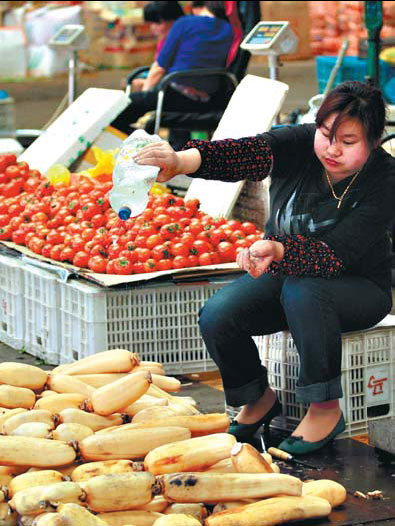Economy
Despite measures, inflation could shoot past target
By Gao Changxin (China Daily)
Updated: 2011-04-19 08:46
 |
Large Medium Small |
|
A stall owner waters lotus roots to keep them fresh at a marketplace in Nanjing, Jiangsu province. Rising inflation, especially in food and vegetable prices, may lead to more government actions, UBS said on Monday. Nan Shan / For China Daily |
Hikes in reserve requirement ratio, interest rates not enough: Analyst
SHANGHAI - China's inflation this year will overshoot the government's target despite more expected tightening measures, Wang Tao, head of China Economic Research at UBS AG, said on Monday.
Consumer price index (CPI), a main gauge of inflation, for the full year will average 4.8 percent after reaching a high in the second quarter, surpassing the 4 percent target the government has set earlier this year, said Wang in a news briefing in Shanghai.
On Friday, the National Bureau of Statistics said CPI rose by 5.4 percent from a year earlier in March, up from 4.9 percent in February and the fastest clip since July 2008.
That increase comes after the central government has said repeatedly that curbing inflation is the government's top economic priority this year. It has taken a series of tightening measures to fight inflation, including four interest rate increases since October.
Wang said although she expects "multiple" reserve requirement ratio hikes and two benchmark interest rate increases for the rest of the year, it is still inadequate to hold inflation within the government's target.
While food price, a main contributor of China's inflation, would ease with the advent of the summer harvest season, non-food price, which is temporarily muffled by administrative measures, will gain to add inflationary pressure, Wang said.
On April 2, the National Development and Reform Commission, China's economic planner, held informal talks with 17 retail industry associations, asking them to delay price hikes out of "social responsibilities".
"Measures like that are just temporary and won't last forever. Faced with rising cost, companies will increase prices sooner or later, putting pressure on inflation," Wang said.
The nation's ever-inflating foreign exchange reserve is another source of inflation, Wang said. China must pump yuan into the market to buy dollars and other currencies that enter into the economy, given that the nation's currency is not fully convertible.
The People's Bank of China (PBOC) said on Friday that the country's foreign-exchange reserves swelled by $197.4 billion in the first quarter to $3.0447 trillion.
The nearly $200 billion jump comes as China registered a trade deficit in the first quarter, meaning that foreign investment and speculative capital inflows have intensified.
Wang expects trade surplus will return and reach about $150 billion. And that, combined with increased foreign investment and speculative capital, will seem to make it even harder for the central government to contain inflation.
"In fact, the accumulating foreign exchange reserve, which is to add a total of $400 billion this year, will make the government's tightening measures less effective," she said.
The central bank announced on Monday the 10th hike in the banks' reserve requirement ratio since last year.
Wang said while the hike will lock up about 340 billion yuan ($52 billion), it is only about enough to soak up the additional cash brought by the inflating foreign exchange reserve.
Barclays Capital said in a research note e-mailed to reporters on Monday that despite the successive reserve requirement ratio hikes, economywide, liquidity remained ample.
"Recent reserve requirement ratio hikes serve mostly to withdraw liquidity injected due to maturing PBOC bills and repos and, therefore, have a neutral, rather than tightening, impact on liquidity," the British investment bank said.
China Daily
(China Daily 04/19/2011 page21)
| 分享按钮 |
